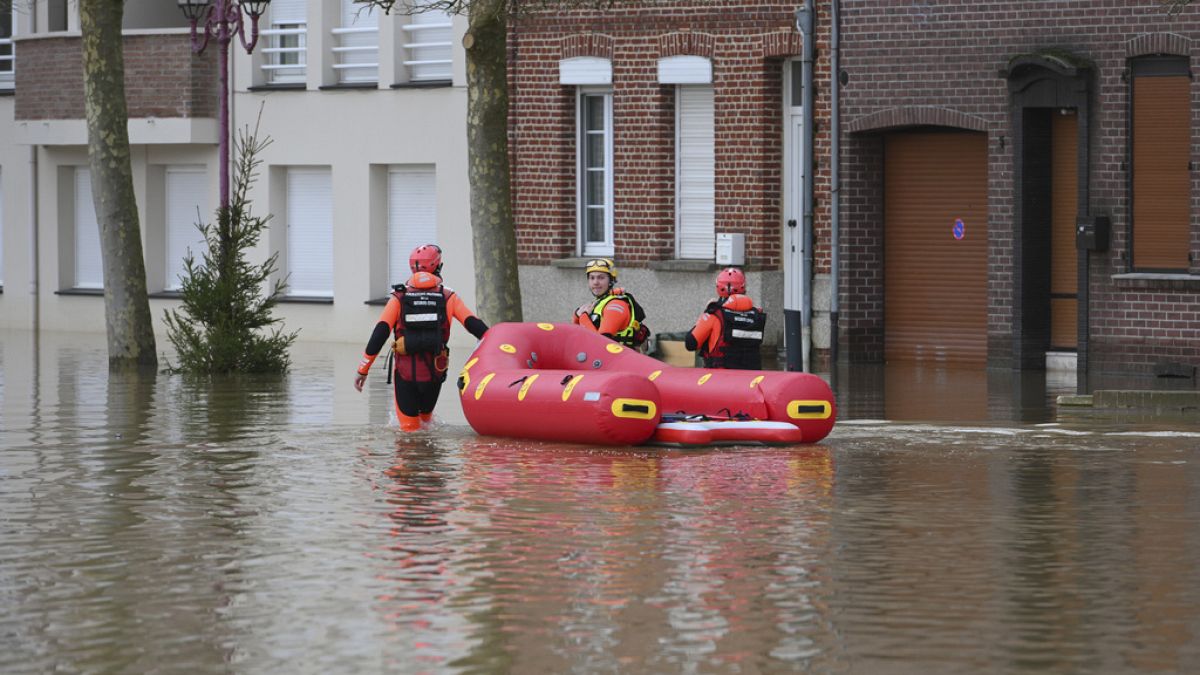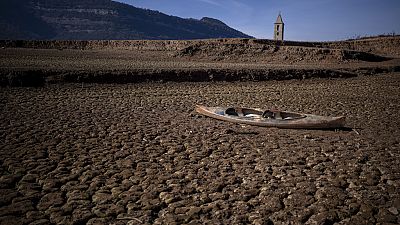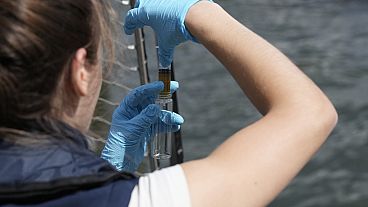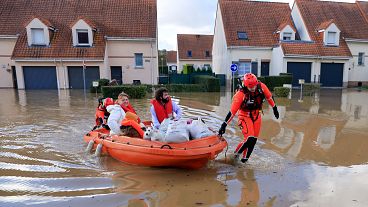The EU executive is preparing to launch a 'water resilience' initiative, with a drought emergency in north-eastern Spain providing a glimpse into one possible future for a Europe increasingly exposed to the adverse effects of climate change.
The European Commission is finalising a plan to increase Europe’s ‘water resilience’ amid increasingly erratic weather climate breakdown, a challenge environment commissioner Virginijus Sinkevičius has likened to the recent energy crisis, and as Catalonia has declared a drought emergency.
The Catalan news came just days after the Spanish region’s water reserves fell below 16% following 40 months of below average rainfall.
The first days of 2024 saw the EU mobilise its civil protection mechanism as parts of Germany and northern France were hit by severe flooding. Meanwhile citizens of north-eastern Spain are facing increasing restrictions on water use after months of what Catalan climate action minister David Mascort has described as the worst drought in Spain’s history.
The European Commission has recognised that such extremes are no longer anomalies, with officials routinely using the term ‘climate breakdown’. Its response is a forthcoming ‘water resilience’ initiative to reduce flood risk and avert shortages of the kind that already threaten to make some parts of Europe unsuitable for farming.
The Commission has been inundated with advice since president Ursula von der Leyen announced the plan in September, making it a key priority for the last year of her flagship Green Deal policy. In October, the European Economic and Social Committee published a declaration calling for a new Blue Deal, backed in an open letter by a cross-party group of MEPs.
The EU advisory body’s recommendations range from labelling products to show how much water was used in their production, to making sustainable water use a precondition for access to EU funding. The same day, environmental groups issued a joint call for a dedicated new EU Climate and Water Resilience Law.
Meanwhile, environment commissioner Virginijus Sinkevičius outlined initial plans for the water initiative. Addressing lawmakers on the European Parliament’s environment committee, he drew a comparison between potential future water shortages and the energy shock that followed Russia’s full-scale invasion of Ukraine. “It took a major crisis to teach us how precious our energy is,” the Lithuanian politician said. “It is time to apply a different mind-set to water as well.”
Sinkevičius mentioned a number of specific issues that need to be addressed: drinking water is leaking from pipelines at “unacceptably high” levels. “Over-abstraction and over-allocation of water resources must come down,” he said, and major users in the industrial, energy, transport and agriculture sectors “must do more to integrate water efficiency and water protection into their everyday practice”.
The commissioner also referred to the EU’s central legislation on water resources, the Water Framework Directive, calling on lawmakers to support a proposed extension of the list of pollutants that must be routinely monitored for. The same law also requires environmental and resource costs to be priced into water supplies: this approach was “not used enough to promote a more efficient use – far from it”, Sinkevičius said.
These signals from Brussels have caused unease in some quarters – not least among farmers, whose negative reaction to proposed restrictions on pesticide use and nature restoration plans are already causing major headaches for EU leaders. At a discussion of climate and environment policy hosted by the commission in November, lobbyists for the agriculture sector voiced concerns about potential limits on water extraction, noting that irrigation is used in two-thirds of Spanish agricultural production.
“The worst is undoubtedly in front of us in terms of climate breakdown,” the commissioner told reporters in early January after attending a meeting of European environment ministers in Brussels. But he was now more guarded when it came to possible responses at the EU level to water scarcity. “We’re not looking at prioritisation of the sectors for water use,” Sinkevičius stressed. “I hope that we will never arrive at that point, and that this is a resource that we will manage and secure for future generations.”
Commission officials have confirmed there will be no legislative proposals on the table when the executive presents its water plan, slated for publication on 12 March alongside a related paper on adaptation to climate change. And green groups are not expecting a last-minute environment policy bombshell from the outgoing commission ahead of EU elections in June.
“I don’t think it’s going to be revolutionary, but we hope to see clear recommendations from the von der Leyen commission to the next,” said Claire Baffert, senior water policy adviser at the WWF European policy office in Brussels.
“We hope to see the commission setting clear priorities on upgrading nature-based solutions such as restoring floodplains and reconnecting rivers to them so that they can retain and store water, or re-meandering rivers to slow [them] down,” Baffert told Euronews. “But also on water savings, perhaps with concrete targets, to stress the need to adapt to decreasing water availability,” she added.
Baffert also referred to a “huge implementation issue” regarding existing EU legislation, which she puts down largely to a lack of political will to enforce the Water Framework Directive. Around half of surface waters surveyed are subject to exemptions from achieving the good ecological and chemical status that by law should be achieved by 2027, which goes some way to explaining why barely a third of lakes and rivers currently meet the basic quality criteria.
In fact, Baffert believes most of the current issues around water resilience could be solved by effective application of existing laws, a position shared by the European Environmental Bureau, an NGO umbrella group that last October described the water directive as “the forgotten tool to fix Europe’s water crisis”, while urging the EU executive to step up enforcement.
Sergiy Moroz, the group’s head of water and biodiversity, told Euronews he saw no need for new water regulations. “The Water Framework Directive is a good flexible piece of legislation that needs to be properly implemented and funded,” he said, arguing that 2027 was “around the corner” and meeting it should remain the focus. “In the end we get water from nature so getting our aquatic ecosystems healthy should remain the key priority if EU wants to be water resilient.”
Asked whether the commission was planning to step up enforcement of the existing rules, a spokesperson said only that member states were obliged to implement them “irrespective of the coming initiative for water resilience”. The EU executive is currently assessing updated river basin management plans that all EU countries were required to submit by March 2022, outlining how they intend to meet the 2027 deadline, the official said, after which it will issue “recommendations for follow-up actions”. At the end of last year, six countries including Spain had yet to finalise their plans.
Still, pressure is growing on the EU executive to address the challenges arising from a changing water cycle, and not only acute water scarcity. Speaking to reporters on the sidelines of the informal Council summit last month, Bulgaria’s environment minister Julian Popov told Euronews he had called for a full-blown European water strategy. “I don’t think directives are sufficient in principle, we have to have a proper, serious strategy, not just administrative requirements,” Popov said.
The Bulgarian minister mentioned the sometimes highly localised impact of changing weather patterns. “Something that we see in Bulgaria is very heavy rains for a very, very short time in a very small area, and they hit a single village,” Popov said. “We know that climate change can manifest itself in unusual ways so we have to be prepared for this.”
At an EU Council summit of agriculture ministers last week, Portugal called for a concrete plan “to reduce the European Union's vulnerability to the effects of climate change on water resources”, with public funds channelled into bolstering water security. Lisbon suggested the plan could be called “RewaterEU”, in a note endorsed by Cyprus, Hungary, Italy and Romania.
Countries on the frontline of climate breakdown will be watching eagerly to see how the commission envisages Europe’s response. “It will be of utmost importance for the future of Spain,” Sinkevičius said after meeting the drought-stricken country’s environment minister Teresa Ribera on 24 January. “We will gladly contribute to this initiative on water and droughts and resilience to the effects of climate change on water policies,” Ribero replied on social media. “We have a lot at stake.”



